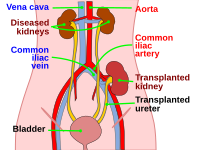
Photo from wikipedia
Supplemental Digital Content is available in the text. Background. Gaps in our knowledge of long-term outcomes affect decision making for potential living kidney donors. Methods. The Scientific Registry of Transplant… Click to show full abstract
Supplemental Digital Content is available in the text. Background. Gaps in our knowledge of long-term outcomes affect decision making for potential living kidney donors. Methods. The Scientific Registry of Transplant Recipients was asked to determine the feasibility of a candidate registry. Results. Ten living kidney donor programs evaluated 2107 consecutive kidney donor candidates; 2099 of 2107 (99.6%) completed evaluations, 1578 of 2099 (75.2%) had a decision, and 790 of 1578 (50.1%) were approved to donate as of March 12, 2020. By logistic regression, candidates most likely to be approved were married or had attended college or technical school; those least likely to be approved had ≥1 of the following characteristics: Black race, history of cigarette smoking, and higher blood pressure, higher triglycerides, or higher urine albumin-to-creatinine ratios. Reasons for 617 candidates not being approved included medical issues other than chronic kidney disease risk (25.3%), chronic kidney disease risk (18.5%), candidate withdrawal (15.2%), recipient reason (13.6%), anatomical risk to the recipient (10.3%), noneconomic psychosocial (10.3%), economic (0.5%), and other reasons (6.4%). Conclusions. These results suggest that a comprehensive living donor registry is both feasible and necessary to assess long-term outcomes that may inform decision making for future living donor candidates. There may be socioeconomic barriers to donation that require more granular identification so that active measures can address inequities. Some candidates who did not donate may be suitable controls for discerning the appropriateness of acceptance decisions and the long-term outcomes attributable to donation. We anticipate that these issues will be better identified with modifications to the data collection and expansion of the registry to all centers over the next several years.
Journal Title: Transplantation Direct
Year Published: 2021
Link to full text (if available)
Share on Social Media: Sign Up to like & get
recommendations!